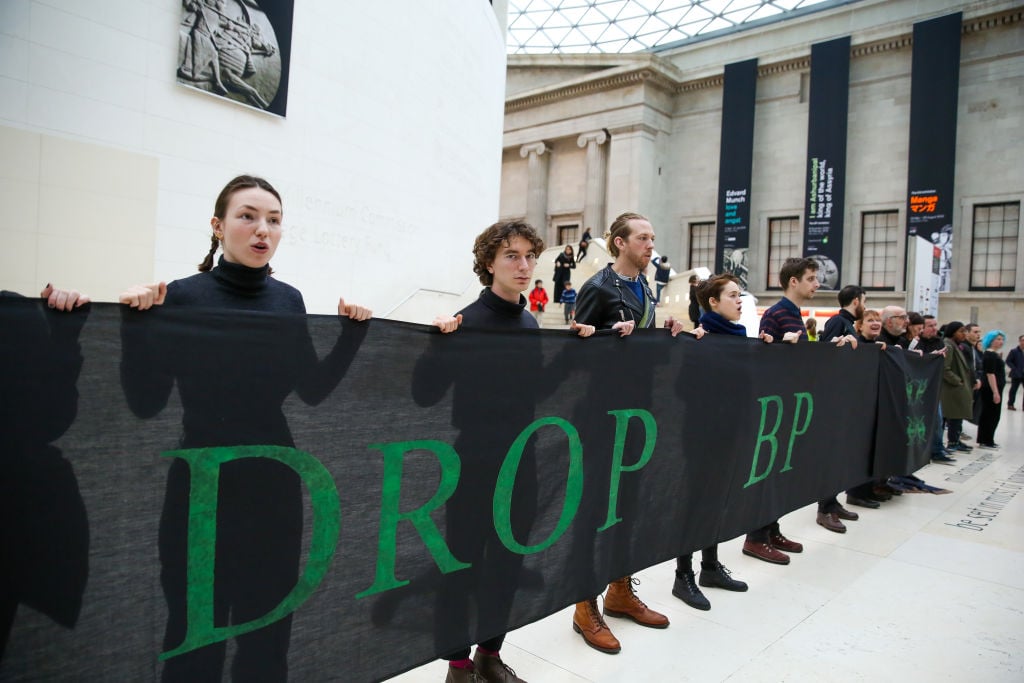
The British Museum’s chair of trustees defended the institution’s continued partnership with the oil giant BP in a public debate with climate change activists held yesterday in London. The unprecedented event follows the high-profile resignation of a trustee who cited the institution’s relationship with the company as one of her reasons for reluctantly stepping down.
During the debate, chair of trustees Richard Lambert cited cuts to public funding as the reason the British Museum needed support from big business, but climate campaigners are unhappy that he did not offer an ethical justification for its controversial partnership with BP.
Despite years of high-profile demonstrations by the climate activists BP or not BP?, and Greenpeace, seeking to put an end to the company’s sponsorship of the museum, the debate on Wednesday, July 31, marked the institution’s first public engagement with climate change campaigners.
Museum Ethics
Chris Garrard, the co-director of Culture Unstained, a campaigning group seeking to end fossil fuel sponsorship of cultural institutions, debated the issue with Lambert and the UK head of BP, Peter Mather. During the discussion, Garrard questioned the ethics of the partnership, calling for the museum to develop ethical practices that are “defensible” to a public increasingly concerned by climate change.
He specifically highlighted BP’s lobbying of the Trump Administration to expand the company’s drilling in the Arctic, saying that this is “at odds” with the British Museum’s planned exhibition about culture and climate in the region. (The exhibition opening in May 2020 is not sponsored by BP.)
Garrard tells artnet News that the British Museum’s chairman of trustees made no ethical justification for continuing to “endorse and promote” BP during their discussion. “The debate exposed just how ethically conflicted the British Museum is,” Garrard says. “According to Richard Lambert, the museum ‘accepts that climate change is the great issue of our time,’ and yet it won’t act on the simple truth that a company planning to stay 97 percent invested in fossil fuels will only exacerbate that crisis.”
Garrard said that the discussion made it clear that the museum is “simply unwilling to back up its words with meaningful action.”
Activists protesting BP’s sponsorship of the British Museum. Photo by Dinendra Haria/SOPA Images/LightRocket via Getty Images.
In the public forum, Lambert focused on the “tight” financial pressure the museum is facing after years of cuts to public funding. A spokeswoman for the museum confirms to artnet News that it is facing “considerable” financial pressure from the reduction in real terms of grant-in-aid from government, with its public funding cut by 30 percent since 2010.
“Temporary exhibitions are expensive to plan and stage,” the museum spokeswoman says. “The money we receive from BP and other supporters allows us to successfully plan exhibitions long-term and deliver public benefit.” She adds that these exhibitions often focus on “less well known cultures.” such as the Scythians or Assyrians, which “would not happen” without external support.
During the discussion at the London offices of Tortoise Media yesterday, Peter Mather of BP said that the company recognizes climate change as “the defining issue of our era.” He emphasized its commitment to changing how they drill for oil, and cited its investment in renewable energies including solar power. artnet News reached out to BP for comment, but did not hear back by press time.
Trustee Resignation
The debate came a week and a half after British Museum trustee Ahdaf Soueif stepped down from the board, citing publicly the museum’s relationship with BP among other reasons for her departure. In a powerfully worded comment piece, she said she regretted the institution’s lack of engagement with “the legitimate and pressing concerns of young people across the planet.”
“We have a formidable group of trustees who speak their minds and challenge the museum, that is very much a part of their role,” the museum spokeswoman says. While the board has not met since Soueif’s departure, the spokeswoman stressed that “questions around sponsorship are debated and discussed.”
The artist activist group Bp-or-not-Bp stage a ceremonial performance at the British Museumin 2016. Photo by Kristian Buus/In Pictures via Getty Images Images.
All this comes at a time of increased public scrutiny of arts and culture sponsorship in the UK. After escalating campaigns against museum funding from the Sackler foundations, led by Nan Goldin’s activist group P.A.I.N., museums led by the South London Gallery and the Tate have rejected future sponsorship from the family linked to the opioid crisis. The National Portrait Gallery in London is another prestigious institution that will forego Sackler money.
A year ago, a group of artists and designers removed their work from an exhibition about politically-engaged art at the Design Museum after it emerged the institution had hosted a reception for arms dealers. The museum attempted to distance itself from the event but has not signaled that it will change its venue-hire policy.
“It is right that these questions are debated and discussed and of course museums and galleries should be open to scrutiny,” the British Museum spokeswoman says.
How Much Funding?
The BM receives funding from BP each year, although exactly how much is a matter of speculation. It is part of a wider £7.5 million ($9 million), five-year commitment from the company that sees it also supporting the Royal Opera House, the Royal Shakespeare Company, and the National Portrait Gallery through 2022. BP or not BP? estimates that if this funding was distributed evenly it would amount of 0.3 percent of the British Museum’s annual income. In November, the Aberdeen Art Gallery reopens in Scotland with £1 million ($1.2 million) sponsorship from BP. The museum’s BP Galleries will host the BP Portrait Award in 2020.
The British Museum also raised eyebrows when it accepted sponsorship from the Japanese tobacco giant JTI to support an acquisition fund for modern Japanese objects. The museum spokeswoman stressed that JTI “does not fund exhibitions or promote their brands in the museum.”